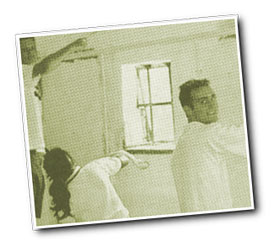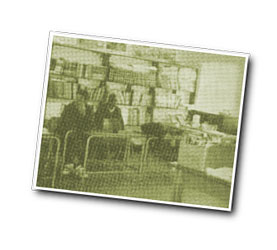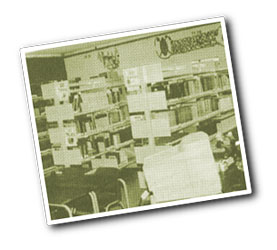

by Anthony G. Craine
Service projects in South Africa
Create a lasting legacy for Youth Exchange students
Before Rotary Youth Exchange Nathan Peto arrived in South Africa in 2001, the Mawila Primary School in Soweto didn't even have a functional library.
 "They had some books on one or two bookshelves," say Peto, whose exchange was sponsored by the Rotary Club of Brandon, Man., Canada (District 5550) in his hometown. "They had outdated textbooks for high school and many other books that were in no particular order and has little relevance to learners of primary school age."
"They had some books on one or two bookshelves," say Peto, whose exchange was sponsored by the Rotary Club of Brandon, Man., Canada (District 5550) in his hometown. "They had outdated textbooks for high school and many other books that were in no particular order and has little relevance to learners of primary school age."
Peto, along with other inbound Youth Exchange students staying throughout District 9300, cleaned up the book room, painted the walls, installed new shelves, and stocked them with books appropriate for the students at the school. The books were catalogued in a computer database, and the library was made available to the public, not just the students at the school.
The refurbished library opened with great fanfare. Members of the surrounding community came out to show their appreciation with dancing and singing. Government officials attended, along with Rotarians. The exchange students, who came from all over the world, had succeeded in making significant difference in the lives of the students, their families, the teachers, and the entire community.
And even though Peto has been back in Brandon for nearly two years, he has the satisfaction of knowing that the goodwill he and the other students generated continues to this day. The Mawila Primary School library renovation was not simply an isolated service project carried out by foreign visitors who would soon return to their home countries; it was the first project undertaken by an ambitious District 9300 initiative known as Rotary Exchange Projects (REP).
REP was organized in 2001 by John Egan, a member of the Rotary Club of Midrand, South Africa , who served on the District 9300 Long-Term Youth Exchange Committee. The program began when Eagan gathered that year's inbound Youth Exchange students at the district conference and asked of they would be interested in working on service projects. Interested students were taken on a tour of possible projects sites and asked which ones they wanted to be involved with.
"I was reluctant to start with the library, as I thought it would be too big, but the students thought otherwise," Eagan recalls with pride.
 Through REP, Eagan hoped to engage students in a new way. Because of the manner in which the South African school calendar is set up, Youth Exchange students from other countries often find they must enroll in classes a grade lower than those they would attend back home. REP can provide the analytical and problem-solving activities needed to keep such students intellectually engaged and enthused. REP work requires some time off from school, and the students must have the approval of their host club, host parents, and the school before they can participate.
Through REP, Eagan hoped to engage students in a new way. Because of the manner in which the South African school calendar is set up, Youth Exchange students from other countries often find they must enroll in classes a grade lower than those they would attend back home. REP can provide the analytical and problem-solving activities needed to keep such students intellectually engaged and enthused. REP work requires some time off from school, and the students must have the approval of their host club, host parents, and the school before they can participate.
"I've tried to make every project a bit educational for the students," Eagan says, adding that the goal is to have each students participate in the spectrum of activities associated with a project, rather than focus on one particular task or role. "These young men and women are very talented," he says.
One of the challenges of REP is maintaining continuity while giving the current participants a sense of ownership. Eagan says this is accomplished in several ways. First, REP is run by the students themselves. Students serve six-month terms on the REP committee, and officers complete their term three months before they leave the country, which allows them to share their wisdom with their successors. Similarly, the new students don't feel like interlopers intruding on someone else's effort.
"The existing students must take care to not describe the project theirs," Eagan says. "We try to begin a project with new students involved at the start. So far, it has worked."
Eagan says the continuity of the effort will be tested by REP's recently initiated Rotary Centennial project, which is a business plan aimed at helping participants in selected AIDS-support groups establish small-scale farming ad craftmaking operations as a sustainable income source and a means to improve nutrition.
"REP will have its hands full looking for support," he says of the challenge the students face in locating the resources to make centennial project a reality.
But he group will certainly be prepared. Peto who served as vice-chairman of the REP committee during his stay in South Africa , says promotion always has been a major priority.
"We wanted to make sure that these projects got all the resources we needed to make them worthwhile for the community," he says of the activities undertaken during his exchange year. "We spent hours preparing speeches and writing letters to get funding and equipment we needed to complete these projects."
Students also garnered support from their host clubs. Peto notes that most of the materials used to renovate the Mawila Primary School library - including paint, shelving, and books - came from Rotarian sources.
 After the library projects, REP located another room at the school and turned it into a media center. The REP students convinced a major company to donate computer equipment, while Rotarians donated paint and other supplies. REP students again provided elbow grease by cleaning and painting the room. Then they loaded software onto the 15 new computers and taught the teachers how to use the computers.
After the library projects, REP located another room at the school and turned it into a media center. The REP students convinced a major company to donate computer equipment, while Rotarians donated paint and other supplies. REP students again provided elbow grease by cleaning and painting the room. Then they loaded software onto the 15 new computers and taught the teachers how to use the computers.
Subsequently projects included projects included the renovation of a day-care facility at an AIDS center in Soweto . After the room was painted and cleaned and the leaky roof repaired , REP held a drive to stock the center with new toys for the children.
The students also helped a wildlife-protection operation called Free Me, and the variety of tasks completed shows just how talented and versatile the students are. After helping Free Me put together its own promotional presentation program, REP installed two computers in the group's office to allow for case monitoring and data recording. Finally, the students worked on the grounds at Free Me headquarters to rid the area of non-native plants species.
"Each project had its own tasks, but painting and cleaning, along with organizing all of the exchange students, were definitely big ones," Peto says. "The work overall was not labor-intensive, but many hands made lighter work for all of us. Each student gave his or her all to make sure the projects were big success."
Peto, now in his second year at Brandon University , continues to serve. The former Rotary Youth leadership Awards participant still promotes RYLA for the Brandon club. He also helps with the orientation of inbound Youth Exchange students in District 5550 and speaks about his South Africa experiences to help promote Youth lending a hand to local Rotary club service projects.
His credits Youth Exchange and REP with helping him to see a part of the world he would never have experienced otherwise.
"The people in these areas were extremely friendly and welcoming and showed me interesting things about the many different cultures of South Africa ," Peto says. "And REP allowed me to give something back to the country whose people took me in, treated me so very well, and taught me so much."
Anthony G. Craine is senior editor of THE ROTARIAN